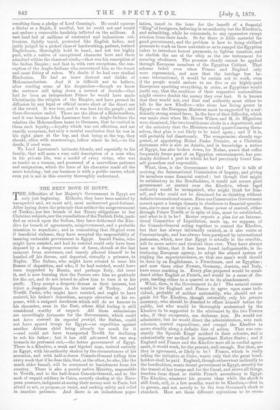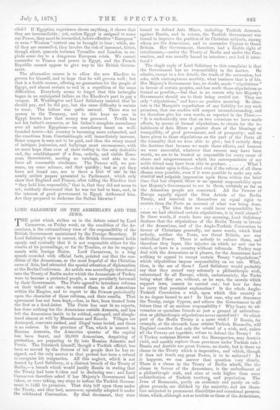THE NEXT MOVE IN EGYPT.
THE difficulties of her Majesty's Government in Egypt are only just beginning. Hitherto, they have been assisted by unexpected and, we must add, most undeserved good-fortune. After laying down the principle that neither the misgovernment of Turkey, nor her breach of her Treaty obligations to her Christian subjects,nor the repudiation of the Turkish Debt, justi- fied an attack upon the Sultan, they have dethroned the Khe- dive for breach of agreements, misgovernment, and a probable intention to repudiate ; and in committing that illogical even if beneficial violence, they have accepted the responsibility of insuring endurable government in Egypt. Ismail Pasha, who might have resisted, and had he resisted could only have been deposed by a dangerous exercise of force, shrank at the last moment from resistance, and tamely allowed himself to be hustled off his throne, and deported, virtually a prisoner, to Naples. The Sultan, who might have refused to issue his firman of deposition, and who, if be had resisted, would have been supported by Russia, and perhaps Italy, did issue it, and is now learning that the Powers owe him no gratitude for the act, and do not intend to allow him to turn it to his profit. They accept a despotic firman in their interest, but reject a despotic firman in the interest of Turkey. And Tewfik Pasha, who might have resisted, and ought to have resisted, his father's deposition, accepts elevation at his ex- pense, with a resigned meekness which will do no honour to his character, even in the East, where filial feeling is still considered worthy of respect. All those submissions are exceedingly fortunate for the Government, which could not have coerced its especial prottige, the Sultan, could not have spared troops for Egypt—an expedition against another African chief being already too much for it —and could not have transported Tewfik for declining to rob his father ; but it has still advanced but one step towards its professed end,—the better government of Egypt. There is a Khedive, a weak and bigoted man, trained entirely in Egypt, with his authority shaken by the circumstances of his accession, and with half-a-dozen Consuls-General telling him every, week that if he does this, that, or the other, he also, like the much abler Ismail, will be sentenced to banishment from his country. There is also a purely native Ministry, responsible to Tewfik, and to the half-dozen Consuls-General, and to the mob of unpaid soldiery in Cairo, secretly chafing at the Euro- pean pressure, indignant at seeing their money sent to Paris, but afraid to act, or propose, or resist, and seeking safety and relief in inactive patience. And there is an industrious popu-
lation, taxed to the bone for the benefit of a financial "Ring" of foreigners, believing in no authority but the Khedive's, and submitting, while he commands, to any oppression except eviction from their lands. So far there is little material for good government, And the problem is how to bring civilised pressure to work on these materials so as to compel the Egyptian rulers to introduce honest payments, to lighten taxation, and to abolish the use of the whip as the one instrument for securing obedience. The pressure clearly cannot be applied through European members of the Egyptian Cabinet. That scheme failed even when France and England only were represented, and now that the tutelage has be- come international, it would be certain not to work, even if the •people would endure to see five or six highly-paid Europeans upsetting everything, in order, as Egyptians would justly say, that the creditors of their respective nationalities might receive double the money they ever lent. It is known that they would not, and that real authority must either be left to the new Khedive—who alone has living power in Egypt—or the European Ministers must be supported by a suf- ficiently strong armed force. In the face of that difficulty, which was made clear when Mr. Rivers Wilson and M. de Blignieres were dismissed, like two troublesome clerks in a department, and of the certainty that the Ministers would quarrel among them- selves, that plan is not likely to be tried again ; and if it is, will probably fail disastrously. The compromise, already sug- gested, of appointing Nubar Pasha Premier, as a Christian statesman who is also an Asiatic, and in knowledge a native of Egypt, has also broken down, for Nubar, aware that coffee frequently forms part of an Egyptian entertainment, has pru- dently declined a post in which he had previously found him- self powerless and responsible.
What, then, is the Government to do ? There is talk of reviving the International Commission of Inquiry, and giving its members some financial control ; but though that might be satisfactory to the Bondholders, it would not secure good government or control over the Khedive, whose legal authority would be unimpaired, who might think for him- self, and who could not be dismissed for so thinking without definite international reason. Even our Conservative Government cannot upset a foreign dynasty in obedience to financial specula- tors, above once or twice a year. Some power of control, either through Prince Tewfik or in spite of him, must be established, and what is it to be ? Reuter reports a plan for an Interna- tional Committee of Liquidation, made up, we suppose, of the Consuls-General acting together to control the Khedive, but that has always informally existed, as it also exists at Constantinople, and has always been paralysed by international jealousies, which, now that Egypt is actually in the crucible, will be more active and virulent than ever. They have always been so bitter, that it has been found indispensable, in in- troducing European agency, to adopt the absurd system of tripling the superintendence, so that one man's work should be done by an Englishman, a Frenchman, and an Egyptian ; and now three other Powers, Germany, Austria, and Italy, have come crashing in. Every plan proposed would be consi- dered either English or French, and would be a cause of dis- pute, tending either to a quarrel or to its abandonment.
What, then, is the Government to do B The natural course would be for England and France to agree upon some indi- vidual, probably of neither nationality, who should act as guide for 4he Khedive, though ostensibly, only his private secretary, who should be directed to efface himself before the public, but who would be thoroughly understood by the Khedive to be supported to the uttermost by the two Powers who, if they co-operate, can dethrone him. He would not administer, but he would direct the administration, veto rash schemes, control expenditure, and compel the Khedive to move steadily along a definite line of action. That was con- stantly the Spanish Kings' method in their colonies, and is substantially our method in important Native States ' • and if England and France and the Khedive were all in cordial agree- ment, it would work, for the present, well enough. But then, are they in agreement, or likely to be ? France, which is really taking the initiative at Cairo, wants only that the great bond- holders shall be paid. England, though• subservient indirectly to the bondholders, wants decent government in Egypt, security for the transit of her troops and for the Canal, and above all things, freedom from direct or visible French ascendancy in Egypt. The Khedive, whatever his present ideas while the shock is still fresh, will, in a few months, want to be Khedive,—that is, to govern, and not merely to be the true Governor's cloak or standard. How are those different aspirations to be recon-
tiled ? If Egyptian experience shows anything, it shows that they are irreconcilable ; yet, unless Egypt is assigned to some one Power, they must be reconciled, before effective " European " or even " Western " control can be brought to bear ; while, un- til they are reconciled, they involve the risk of incessant, bitter, though silent, quarrels between Versailles and London, to ex- plode some day in a dangerous European crisis. We cannot surrender to France real power in Egypt, and the French Republic cannot appear to give way to the British Govern- ment.
The alternative course is to allow the new Khedive to govern for himself, and to hope that he will govern well ; but that is a feeble course, offering no guarantees for the people of Egypt, and almost certain to end in a repetition of the same difficulties. Everybody seems to forget that this imbroglio began in an anticipated failure on the Khedive's part to pay a coupon. M. Waddington and Lord Salisbury insisted that he should pay, and he did pay, but the same difficulty is certain to recur. The failure was quite natural. There was no money in the Treasury, and to this hour no one in Egypt knows how that money was procured. Tewfik has not his father's resources, or his father's complete ascendancy over all native Egyptians—an ascendancy based on well- founded terror—his country is becoming more exhausted, and the exactions from Constantinople will immediately increase. Some coupon is sure not to be paid, and then the weary round of intrigue, jealousies, and bullyings must recommence, with no more hope than ever of their ending in the only desirable end, the establishment of a firm, orderly, and visible Euro- pean Government, needing no tutelage, and able to en- force all reasonable obedience. The Powers will, we pre- sume, try some scheme, and that quickly ; but as yet they have not found one, nor is there a hint of one in the nearly useless papers presented to Parliament, which only show that England and France, after telling the Khedive that " they held him responsible," that is, that they did not mean to act, suddenly discovered that he was too bad to bear, and, in the interest of good government in Egypt, dethroned him. Are they prepared to dethrone the Sultan likewise ?



































 Previous page
Previous page